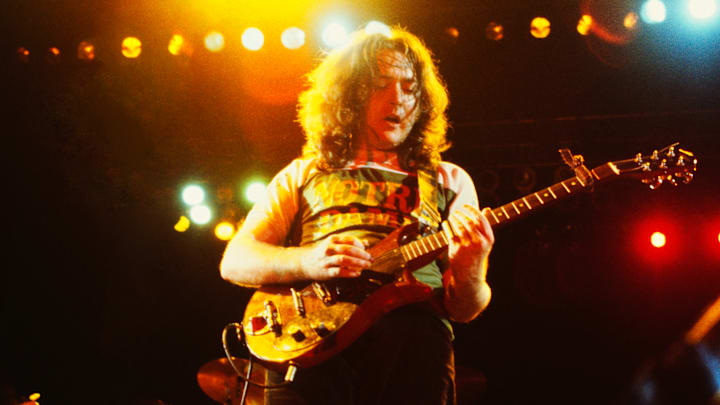Top Priority by Rory Gallagher (1979)
Rory Gallagher is one of the legends of rock & roll guitar. He is often cited by other luminaries as an inspiration, and he cranked out high-end blues rock for several decades before illness related to prescription drug overuse led to his death in 1995. He was 47. Top Priority came a couple of years after his commonly acknowledged masterpiece, Calling Card.
I’m not suggesting that Top Priority was a better album, but I think it may be a better fundamental statement of Gallagher’s artistry. He had stripped everything down to a classic power trio, creating massive sound from his guitar and occasionally from other strings. The man could play anything with strings.
Longtime collaborator Gerry McAvoy provides a solid bassline, allowing Gallagher freedom to roam, and Ted McKenna, who played drums for virtually everyone, adds appropriate crashes where needed. “Wayward Child” is a pure rock gem, while “Bad Penny” seems to spring out of some primordial blues rock wellspring. Top Priority, like all of Gallagher’s best work, is as heavy as it gets without ever once becoming ponderous.
The Raincoats by the Raincoats (1979)
We conclude with the punkiest album on our list and the only one crafted by women. The Raincoats didn’t last long, but their influence was massive. Kurt Cobain was a fan, as were many of the post-punk bands that would go in many directions in the 1980s and beyond.
The original release did not include the Raincoats’ best-known song “Fairytale in the Supermarket,” though it has been the opening track in all subsequent rereleases. The original album opened with the quirky vocal harmony song “No Side to Fall In,” featuring Vicky Aspinall’s violin prominently. They followed that with one unique song after another. “Adventures Close to Home” can almost pass for a garage rocker from the ‘60s. Only it really isn’t even close to that.
The halting, haunting “Off Duty Trip” and insistent, siren-like “Black and White” are all leading up to the song that most people noticed – their even Archier cover of the Kinks’ already arch “Lola.” They do their own bizarre take on swamp rock with “You’re a Million,” again making use of that violin.
The Raincoats only lasted a few more years, but then Cobain’s praise garnered renewed interest in the '90s. In addition to inspiring punk and grunge acts, the Raincoats, with their art school roots, stand as a direct progenitor of bands like the B-52s. With that in mind, it is not out of line to suggest that this largely untrained group of London women had a profound influence on both Athens and Seattle and, consequently, on the whole world of indie rock.
